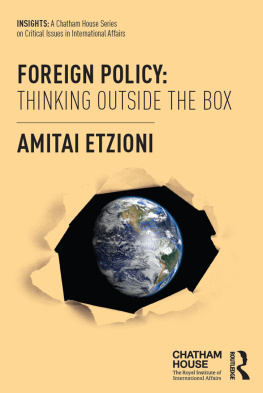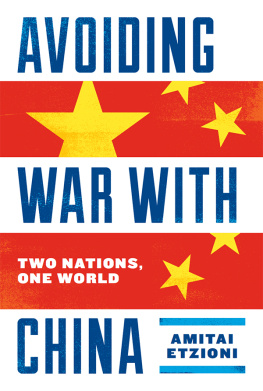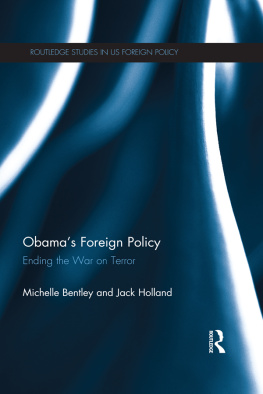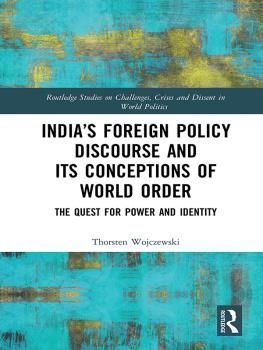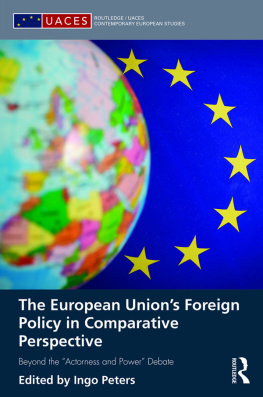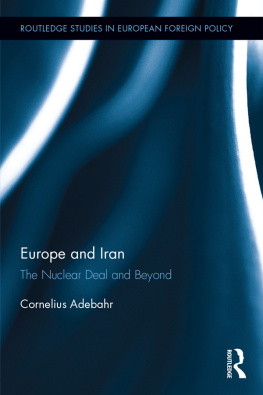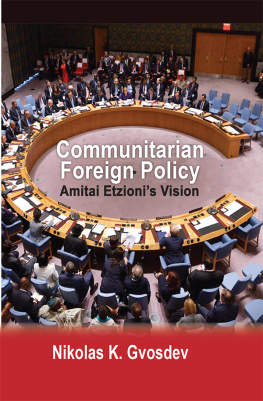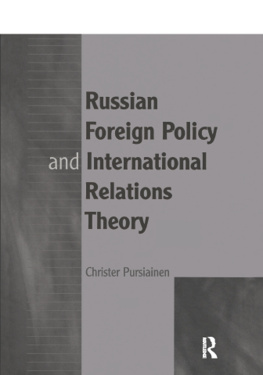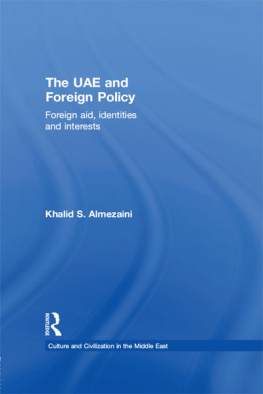FOREIGN POLICY: THINKING OUTSIDE THE BOX
This collection of articles by renowned scholar Amitai Etzioni aims to provoke reconsiderations of basic assumptions of foreign policy.
With chapters focusing on the Middle East, China and the EU, as well as other chapters with a more global focus, the book offers thought-provoking and insightful perspectives on international foreign policy which challenge existing academic policy and debate in the field.
It will be of great interest to students, scholars, and practitioners of foreign policy and international relations.
Amitai Etzioni is Professor of International Affairs and Director of the Institute
for Communitarian Policy Studies at George Washington University, USA. He served as the president of the American Sociological Association in 19945, and in 198990 was the founding president of the International Society for the Advancement of Socio-Economics. In 1990, he founded the Communitarian Network, a not-for-profit, non-partisan organization dedicated to shoring up the moral, social, and political foundations of society.
Insights
A Chatham House Series on Critical Issues in International Affairs
Edited by Caroline Soper, the Royal Institute of International Affairs, Chatham House, London, UK
This series will introduce, engage and challenge practitioners, academics and the general reader alike, to new and critical thinking across a wide range of key global policy issues. In an increasingly complex and dangerous world, authoritative authors will explain, analyse and offer conclusions on the choices facing decision-makers.
1. Foreign Policy: Thinking Outside the Box
Amitai Etzioni
FOREIGN POLICY: THINKING OUTSIDE THE BOX
Amitai Etzioni
First published 2016
by Routledge
2 Park Square, Milton Park, Abingdon, Oxon OX14 4RN
and by Routledge
711 Third Avenue, New York, NY 10017
Routledge is an imprint of the Taylor & Francis Group, an informa business
2016 Amitai Etzioni
The right of Amitai Etzioni to be identified as author of this work has been asserted in accordance with sections 77 and 78 of the Copyright, Designs and Patents Act 1988.
All rights reserved. No part of this book may be reprinted or reproduced or utilised in any form or by any electronic, mechanical, or other means, now known or hereafter invented, including photocopying and recording, or in any information storage or retrieval system, without permission in writing from the publishers.
Trademark notice: Product or corporate names may be trademarks or registered trademarks, and are used only for identification and explanation without intent to infringe.
British Library Cataloguing in Publication Data
A catalogue record for this book is available from the British Library
Library of Congress Cataloging in Publication Data
A catalog record for this book has been requested
ISBN: 978-1-138-67830-9 (hbk)
ISBN: 978-1-138-67833-0 (pbk)
ISBN: 978-1-31555-903-2 (ebk)
Typeset in Bembo
by Sunrise Setting Ltd, Brixham, UK
For all those who were killed because politicians stuck to failed policies.
CONTENTS
PART I
Middle East
PART II
China
PART III
EU
PART IV
Global
Several essays have been updated and modified for this publication. The author gratefully acknowledges the following publishers and publications for permission to use previously published material.
Previously published as The Democratisation Mirage, Survival: Global Politics and Strategy 57:4, 2015, pp. 13956. Reprinted courtesy of Taylor & Francis.
Previously published as The Global Importance of Illiberal Moderates, Cambridge Review of International Affairs 19:3, September 2006, pp. 36985. Publisher: Routledge.
Previously published as Air Sea Battle: A Case Study in Structural Inattention and Subterranean Forces, Armed Forces & Society 42.1, 2016, pp. 16191. Reprinted courtesy of Armed Forces & Society.
Previously published as Mutually Assured Restraint: A New Approach for United States-China Relations, The Brown Journal of World Affairs 202, 2014, pp. 3751. Reprinted courtesy of The Brown Journal of World Affairs.
Previously published as The EU: The Communitarian Deficit, European Societies 15:3, 2013, pp. 31230. Reprinted courtesy of European Societies.
This chapter has not been previously published. It has been available online: http://www.gwu.edu/~ccps/DWU_Platform.pdf
Defining down Sovereignty is to be published by Ethics & International Affairs 30:1, 2016. Reprinted courtesy of Ethics & International Affairs.
Previously published as Spheres of Influence, The Fletcher Forum of World Affairs 39:2, 2015, pp. 11732. Reprinted courtesy of The Fletcher Forum.
Previously published as Self-determination: The Democratization Test, Ethnopolitics 14:5, 2015, pp. 4708. Reprinted courtesy of Taylor & Francis.
Previously published as Ultimate Encryption, South Carolina Law Review, 67:3. Forthcoming.
Note
* Melissa Paul played a major role in editing this book and preparing it for publication.
For those who do not follow foreign policy regularly, according to the media, forming a foreign policy (or making major changes in it) is akin to an American football huddle. Accordingly, the president (or PM) calls in his secretary of state (or foreign minister), maybe the secretary of defense (or the defense minister), and possibly key advisors. They have an extensive give and take, and then the head of state announces the new policy. This is the way we are told President Obama decided to pivot to Asia, which was widely understood to mean that the US would focus less on Europe and the Middle East and more on countering the rising influence of China in South and East Asia. Or that Prime Minister Blair had such a conclave after which he decided that the UK would support and participate in the 2003 invasion of Iraq. Or that Prime Minster Bibi Netanyahu and his ministers and staff decided after a long meeting to oppose a two-state solution. Nothing could be further from the truth.
In effect, forming foreign policyor, similarly, changing one significantlyis as a rule the result of a very long and complicated process. One reason is that different actors within the government have different viewpoints about what ought to be done and different interests in the course to be followed or avoided. The military is often strongly interested in building up its forces and budget and justifies these increases by pointing to one threat or another to national security. It does not necessarily favor war, but it tends to favor preparing for one or more. The State Department is often more committed to seeking resolutions via diplomatic meansand to providing foreign aid. The Commerce Department favors selling most anything overseas; the CIA often raises concerns about the effects of selling drones, shoulder-fired missiles, advanced computers, and much more to foreigners. Domestic agencies often warn about overcommitting to projects overseas while urgent needs at home are neglected. Even within each agency and within the White House, differences prevail.
In addition, each camp has allies outside the government. Lobbyists of the defense industry will often support plans to increase military expendituresthough they are likely to differ in details from what the Pentagon seeks. For instance, defense contractors have a special interest in high-cost items. They can earn much more, and face much less competition, if they build aircraft carriers and nuclear submarines than if they make hand grenades and Kevlar vests. Progressive groups will seek more attention to human rights and peaceful democracy promotion and reducing inequality. And the public at large is also involved. Some segments of it are often critical of a president who shies away from confrontations, and in effect pressure him to form a more assertive foreign policy, while other segments will be alarmed by assertive moves already undertaken.

